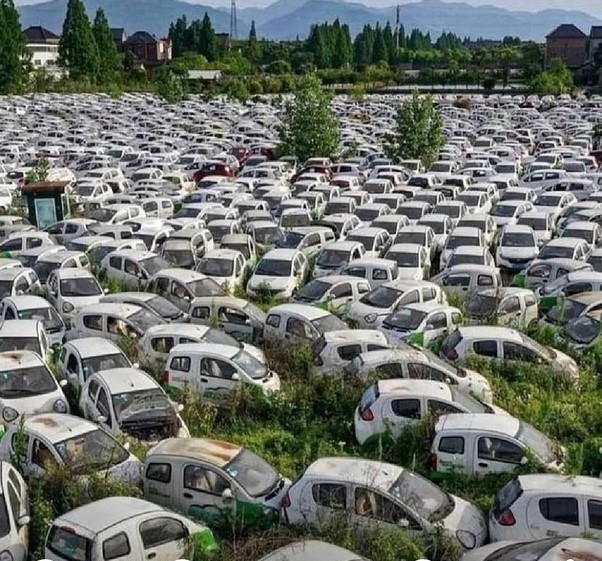
EV’s in France unsold because batteries cost too much to replace.
Nearly 4,000 Car Dealerships Beg Biden to Pull the Plug on ‘Unrealistic’ EV Mandates
The climate cultists who have implemented EV mandates clearly forgot that “sticker shock” is a real thing for most people.
By Leslie Eastman – November 30, 2023
Electric vehicles are piling up on dealership lots across the country, as Americans are finding them too expensive to buy, run, and maintain…thanks to “Bidenomics.”
EV inventories have increased by 506% from a year ago, with EVs sitting on lots for longer, according to CarGurus’ October report, released this month. EVs sit on the market an average 82 days versus 64 days for gas-powered vehicles, it said. In response to slowing demand, automakers like Ford and GM are cutting production.
EVs are still too expensive for most people, even with government incentives, surveys say.
“While consumers still have plenty of concerns surrounding an EV’s battery range, price remains the higher priority when purchasing an EV,” said Julia Martinez, an energy & auto analyst at business intelligence company Morning Consult, in a report.
Car dealerships are begging Biden for help, as they want him to use his pen and phone to undo the ridiculous EV mandates that have popped up across the nation…thanks to green energy pseudoscience and climate cultists.
Nearly 4,000 car dealerships signed an open letter to President Biden urging him to delay the timeline for proposed emissions standards that would force two-thirds of new vehicles sold by 2032 to be electric.
The opposition, which includes 3,882 individual dealers from all 50 states that collectively call themselves EV Voice of the Customer, sounded an alarm that auto manufacturers have also been ringing: consumers aren’t ready to go electric.
“Already, electric vehicles are stacking up on our lots, which is our best indicator of customer demand in the marketplace,” the groups stated in the letter on Tuesday. “Mr. President, no government agency, no think tank, and no polling firm knows more about the automobile customer than us”.
The price differential between gas and electric vehicles is significant.
Joe Mehling, the executive manager of Dave White Chevrolet in Sylvania, has been in the business for decades and said it’s changing, but not in a way he necessarily likes. He said he wasn’t a part of the letter to Biden but still agrees with the dealerships.
“I think we’re moving too fast,” he said. “I think we’re jumping in with both feet on something that maybe the public isn’t ready for.”
Mehling said the dealership had to make many changes to prepare for electric vehicles.
“We’re in a position now where we’re well ahead of where the consumer demand is,” he said, meaning many people aren’t buying them, possibly because some consumers can’t afford them.
So, how much more are electric vehicles? The 2024 Chevy Blazer is sold in both electric and gas-powered versions.
Mehling said at his location, they sell the electric version for $61,000 and the gas-powered equivalent with the same equipment for $51,000.
The climate cultists who have implemented these policies clearly forgot that “sticker shock” is a real thing for most people.
The price of these vehicles could also rise in response to the use of non-Chinese “locally sourced” materials required to make the lithium-ion batteries used in EVs, partly in response to China’s recent manipulation of the graphite supply.
Western lithium and graphite miners have started charging the electric vehicle (EV) supply chain higher prices for their material, meeting demand for environmentally-friendly and consistent supply that is not linked to China.
In presentations and interviews at this week’s Benchmark critical minerals conference in Los Angeles, industry executives, consultants and investors touted the premium pricing model as a way to help prod development of non-Chinese supply, a goal of Washington, Brussels and other Western governments.
The surcharges mirror a plan from the rare earths industry as Beijing exerts control of the critical minerals market and some EV backers worry that weaker environmental standards among some Chinese miners could tarnish the industry’s clean energy credentials.
China refines more than 90% of the world’s graphite and last month said it will require export permits for the metal, the largest component of an EV battery.
Consumers may also be wary of the reliability of EVs, as demonstrated in this clip.
Finally, the maintenance costs and the practical impact of charging time are part of the considerations that purchasers are making, as noted in this CNBC discussion.
